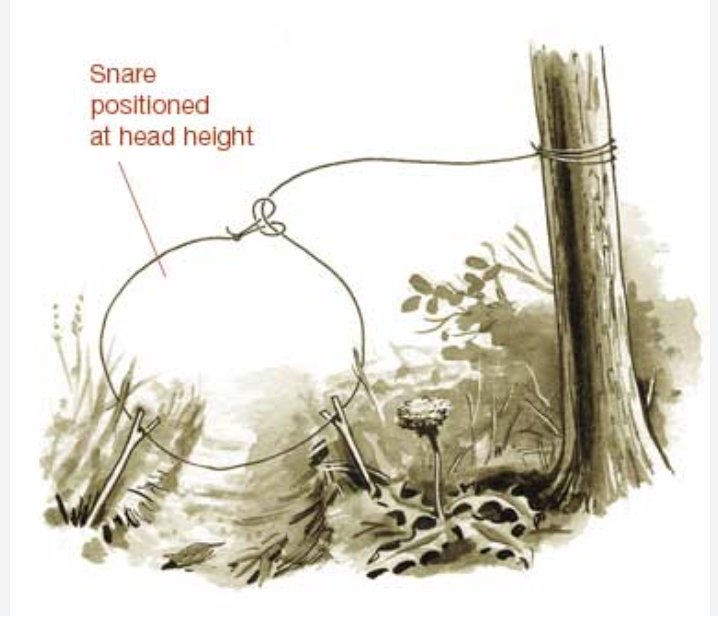Traditionally simple snares are made of wire or cord, though other materials can be used including plant and animal fibres, and placed along existing animal travel routes, or along the anticipated path of travel an animal may use when approaching bait or other attractant.
A traditional snare is a running noose with the free end attached to something sufficiently substantial that acts as an anchor while the other end forms a loop. The loop (noose) draws up around the neck (or torso, leg or foot as intended) of the captured animal and tightens as the animals struggles to stop it escaping. Snares can be live (restraining) or killing snares, though it is important to note that depending on the snare design, the species captured and the manner in which the snare is deployed.
Whilst little information is available on current use of snares in New Zealand, they do not appear to be widely used.
Snares do not appear to have significant application as a pest management tool. National Pest Control Agencies do not have any knowledge on the use of snares in New Zealand , and exclude snares from best practice requirements.
A Landcare Research representative believes that there is very little use of snares for capturing animals in New Zealand. They commented that the limited number of snares in use fell into two categories: (1) Foothold snares for pigs and deer and (2) killing neck snares that individuals make for catching possums and rabbits.
Where snares do appear to be more frequently used is in hunting or bushcraft application, where current suppliers and online advice reference ‘survival’ applications for capturing wild animals to eat; though again this use is still limited.
Snares are legal to sell and use in New Zealand. The Animal Welfare Act 1999 requires that snares that are intended to capture an animal alive to be inspected daily and trapped animals must be removed, treated appropriately and released or humanely killed. Once caught, the same requirements apply to wild animals as domestic animals. The code of welfare for transport within New Zealand also applies and a copy is available on the MPI website.
Snares are not recommended by hunting or pest management groups and their use is not recognised as good practice. The Society for the Prevention of Cruelty to Animals (SPCA) has raised concerns about these devices. In addition, the National Animal Welfare Advisory Committee (NAWAC) has recommended the prohibition or restriction as per below points:
- All leg snares are prohibited unless they are hand-held leg snares.
- All neck snares are prohibited with the exception of those snares which are:
- Hand-held restraining neck snares; or
- Killing neck snares; and,
- Power activated; and,
- Voluntarily activated, e.g. by the animal pulling on a bait / trigger (as opposed to walking through a noose by chance);and,
- Incorporated as one component within a device which also includes safeguards to ensure (as far as possible) both target animal and capture location (around the neck) specificity.
The detailed report is available here: NAWAC-Report-Snares-proposals-2020.pdf
In determining a method of trapping for animals, best practice is to avoid unreasonable or unnecessary pain or distress and ensure that there are no more humane alternatives available. Examples of good practice guidance are available on the Bionet webpage www.bionet.nz.


